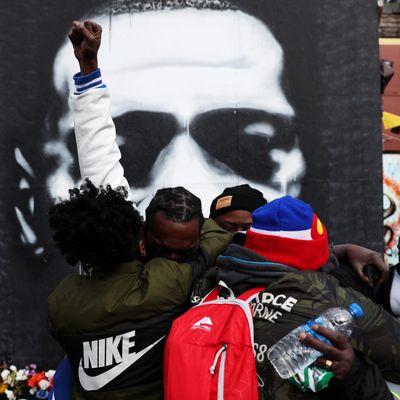
In the aftermath of the Derek Chauvin guilty verdict, I spoke with features writer Zak Cheney-Rice about whether the trial marks any kind of turning point in criminal justice, where police reform goes from here, and more.
Ben: You wrote that the Derek Chauvin trial, which ended in his conviction on all counts today, was a “bilateral effort to defend the virtues of policing” that resulted in a guilty verdict in large part because Chauvin’s behavior could be used as an unimpeachable example of what constitutes going too far for an officer. And that “justice for people like George Floyd has nothing to do with the rare officer an unjust institution chooses to rebuke.” Having said that, were you surprised that Chauvin was found guilty — and so quickly?
Zak: Yes, it is surprising. This is a rare thing, and I was not at all sure it would be the outcome. I think it makes more sense in the context of this historic pressure on police to behave differently, which I suspect has a lot to do with why so many officers testified against Chauvin, than it does as one of the more familiar prosecutions of police. But again, we’re still working with very small numbers. Police are not just rarely found guilty; they’re rarely prosecuted.
Ben: To what extent do you think this moment might be a turning point for police accountability writ large? As you wrote, public opinion on this matter is very different from what it has been, and there is much more pressure on prosecutors and police departments than just a few years ago. It may be true that the Chauvin case is sui generis in many ways, but just because police bureaucracy might want to treat it as an example of a discrete bad chapter in law enforcement does not mean the public will.
Zak: If you look at the history of policing in the U.S., it’s apparent that, for all its rarity, we’re still seeing more prosecutions and convictions for police who kill people in the line of duty than at pretty much any other point. I’m thinking of Chauvin as well as Michael Slager in South Carolina and Jason Van Dyke in Chicago. So while I’m hesitant to suggest this particular trial might be a turning point, I think it’s clear that we are in the midst of an aberration. How durable that will end up being, I don’t know.
I think an important thing to recognize is that, for all the talk and even implementation of reform these incidents have prompted, annual police killings of civilians have remained more or less steady. We’re still at like 1,000 a year.
Ben: Which brings up all kinds of other intractable issues of American life beyond police aggression: the prevalence of guns, the prevalence of untreated mental illness, and poverty.
Zak: To complicate things further, killings of civilians are a tiny, tiny fraction of what make police a violent and authoritarian presence in so many communities. That’s just what seems to get most people into the streets.
The clearer and more encouraging potential turning point, to me at least, is that more people are starting to recognize that police are not inevitable, that it’s good and potentially fruitful to think of other, non-police ways to confront the issues you mentioned above, and that justice and accountability are not synonymous with sending more cops to prison. Zeal for throwing people into prison is impossible to detangle from how we got here in the first place, to a point where on average several police interactions per day end in somebody dying.
Ben: So this trial could eventually be seen as a node in a broader reimagining of public safety. Leaving aside “Defund the police” and the polarization around that phrase.
Zak: I don’t mean the trial so much as what led to it. I think you see that reimagining really becoming part of the national lexicon after Floyd’s murder. The trial is still the trial. It’s still the system eating one of its own. I’ve also written about this before, but I don’t think that shift happens without a ton of other messy and intersecting conditions in place. Anger with Trump’s presidency, the pandemic, spiraling unemployment, etc. It’s why I suspect public approval of the protests declined in the months after they died down. The protests cropped up in a pretty pitched social and political environment, and I think that made their intensity somewhat conditional.
Ben: How hopeful are you that, despite the inevitable dying down in intensity of last year’s protests, the momentum from them will continue to influence the way people view police behavior and the way cops are held accountable?
Zak: I’m hopeful. I don’t think it’s inevitable or irreversible, but I think the average person is talking and thinking about law enforcement in a more critical way today than they were five years ago, myself included, and that certainly seems more pronounced in the past year. I hope that continues.





























